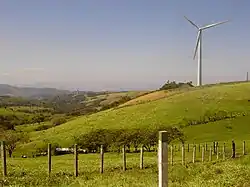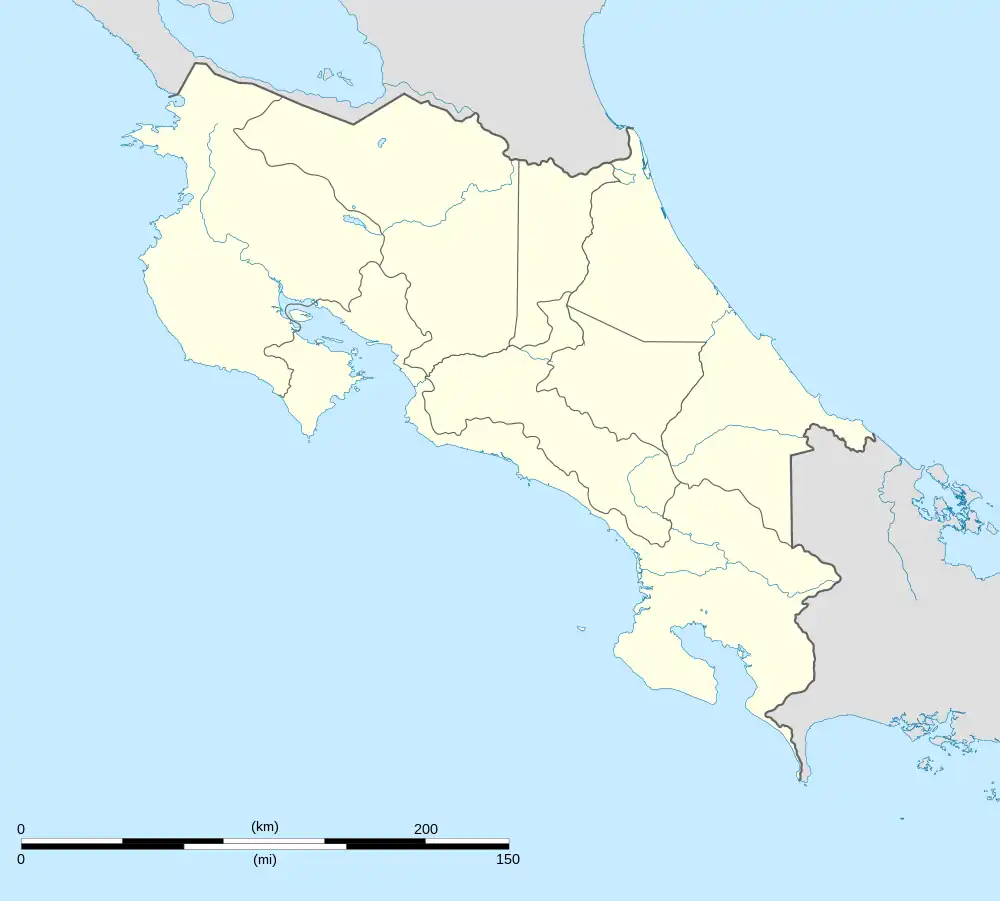Tilarán | |
|---|---|
 Wind turbine in Tilarán | |
Tilarán | |
 Tilarán Tilarán town location in Costa Rica | |
| Coordinates: 10°28′15″N 84°58′03″W / 10.470932°N 84.967445°W | |
| Country | |
| Province | Guanacaste |
| Canton | Tilarán |
| Area | |
| • Total | 139.43 km2 (53.83 sq mi) |
| Elevation | 564 m (1,850 ft) |
| Population (2011) | |
| • Total | 8,677 |
| • Density | 62/km2 (160/sq mi) |
| Time zone | UTC−06:00 |
| Postal code | 50801 |
Tilarán is a small town and a district in Guanacaste Province in Costa Rica. It is the seat of the Tilarán Canton located in the hills overlooking the west shore of Lake Arenal. It is connected by road to El Silencio, and by the 142 road down through the Cordillera de Tilarán hills to Tejona.[1] The area between Tilaran and Tejona is one of the most important wind farms in Costa Rica and turbines are prominent on the landscape. Animal husbandry also forms an important part of the local economy.[2][3]
Geography
Tilarán has an area of 139.43 km²[4] and an elevation of 564 metres.[2]
Locations
- Barrios: Cabra, Carmen, Juan XXIII, Lomalinda
- Poblados: Cuatro Esquinas, Chiripa, Piamonte, Río Chiquito, San Luis, Tejona, Tres Esquinas
Demographics
| Historical population | |||
|---|---|---|---|
| Census | Pop. | %± | |
| 1927 | 1,239 | — | |
| 1950 | 1,922 | 55.1% | |
| 1963 | 3,426 | 78.3% | |
| 1973 | 4,601 | 34.3% | |
| 1984 | 5,926 | 28.8% | |
| 2000 | 7,706 | 30.0% | |
| 2011 | 8,677 | 12.6% | |
|
Instituto Nacional de Estadística y Censos[5] |
|||
For the 2011 census, Tilarán had a population of 8,677 inhabitants.[7] The main religion is Roman Catholicism and the town lies at the center of the Roman Catholic Diocese of Tilarán.
Transportation
Road transportation
The district is covered by the following road routes:
It is connected by road to El Silencio, and via the 142 road down through the Cordillera de Tilarán hills to Tejona.[8]
Economy
The area between Tilaran and Tejona is one of the most important wind farms in Costa Rica and turbines are prominent on the landscape. Animal husbandry also forms an important part of the local economy.
Notable people
- Doris Murillo Boniche – Local artist, retired art professor.
- Leonidas Flores – retired footballer
- Carlos Palacios Herrera – Professional cyclist
- Luis Esteban Herrera – Pianist
- Mark List – Driver on the Monster Jam circuit
- Danadith Tayals – Poet
- Manuel Vargas – Sculptor[9]
References
- ↑ Baker, C.P. (2005). Costa Rica. Dorling Kindersley Eye Witness Travel Guides. p. 150.
- 1 2 "Declara oficial para efectos administrativos, la aprobación de la División Territorial Administrativa de la República N°41548-MGP". Sistema Costarricense de Información Jurídica (in Spanish). 19 March 2019. Retrieved 26 September 2020.
- ↑ División Territorial Administrativa de la República de Costa Rica (PDF) (in Spanish). Editorial Digital de la Imprenta Nacional. 8 March 2017. ISBN 978-9977-58-477-5.
- ↑ "Área en kilómetros cuadrados, según provincia, cantón y distrito administrativo". Instituto Nacional de Estadística y Censos (in Spanish). Retrieved 26 September 2020.
- ↑ "Instituto Nacional de Estadística y Censos" (in Spanish).
- ↑ "Sistema de Consulta de a Bases de Datos Estadísticas". Centro Centroamericano de Población (in Spanish).
- ↑ "Censo. 2011. Población total por zona y sexo, según provincia, cantón y distrito". Instituto Nacional de Estadística y Censos (in Spanish). Retrieved 26 September 2020.
- ↑ Baker, C.P. (2005). Costa Rica. Dorling Kindersley Eye Witness Travel Guides. p. 150.
- ↑ Escultura Manuel Vargas Unversidad de Costa Rica, 2014.
External links